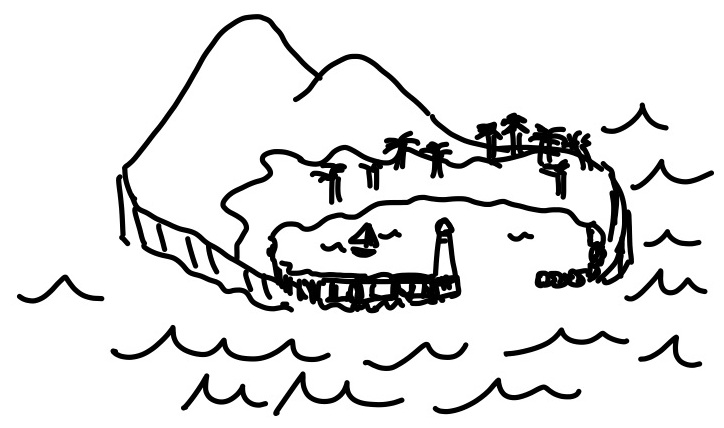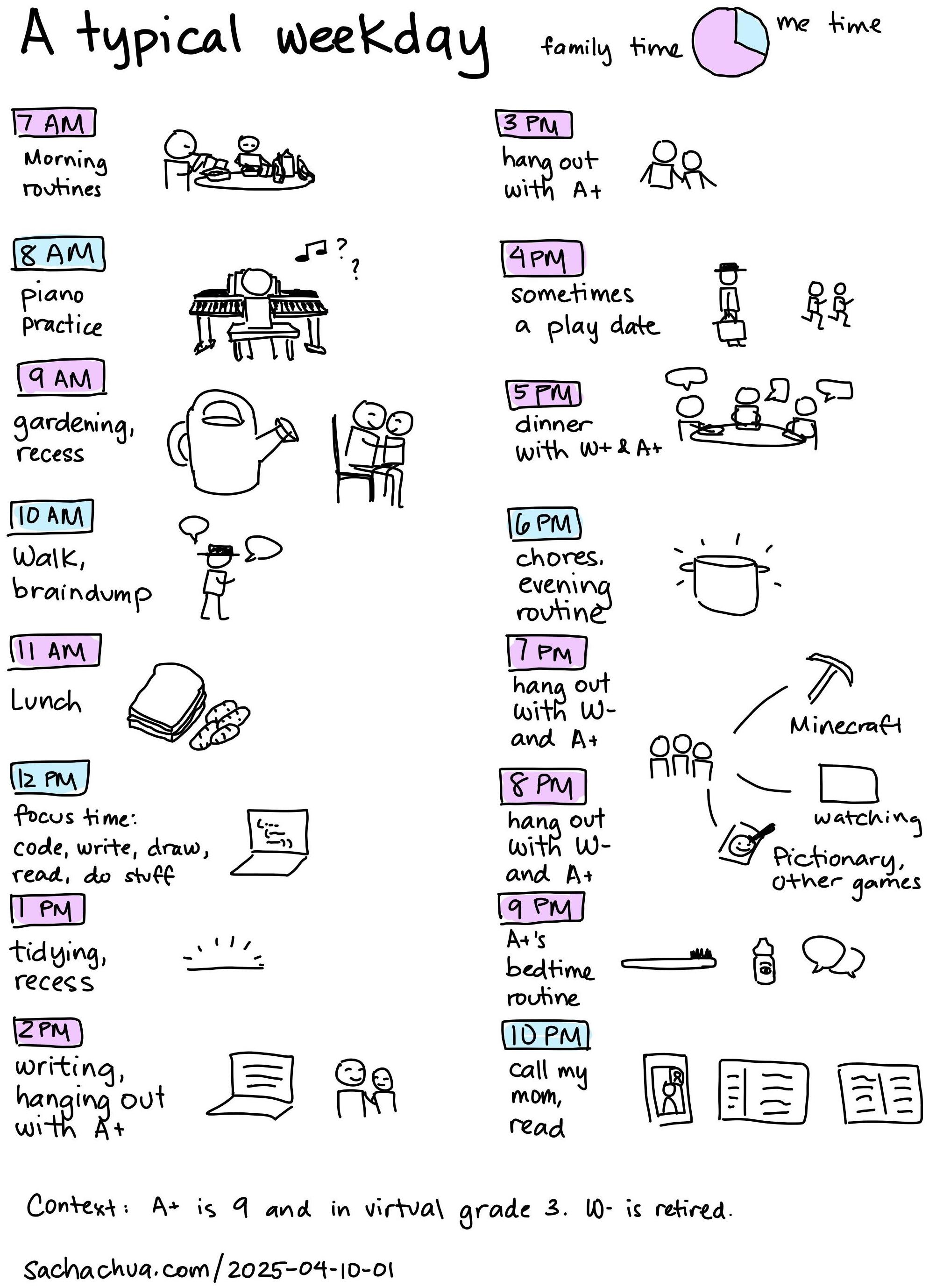A typical weekday
| life, parenting, time
Text and links from sketch
A typical weekday
family time: 11/16 hours, me time: 5/16 hours
- 7 AM: Morning routines
- 8 AM: piano practice
- 9 AM: gardening, recess
- 10 AM: Walk, braindump
- 11 AM: Lunch
- 12 PM: focus time: code, write, draw, read, do stuff
- 1 PM: tidying, recess
- 2 PM: writing, hanging out with A+
- 3 PM: hang out with A+
- 4 PM: sometimes a play date
- 5 PM: dinner with W- & A+
- 6 PM: chores, evening routine
- 7 PM: hang out with W- and A+: Minecraft; watching; Pictionary, other games
- 8 PM: hang out with W- and A+
- 9 PM: A+'s bedtime routine
- 10 PM: call my mom, read
Context: A+ is 9 and in virtual grade 3. W- is retired.
Feel free to use this under the Creative Commons Attribution License.
I came across Hourly Comic Day1 in anhvn's weeknotes. I've been meaning to make some kind of timeline, even if it doesn't feel as insightful or humorous as other people's comics. That's a skill, I can develop it. Besides, capturing bits and pieces of my life now is likely to be something I'm glad for later on.
Some things I notice:
I'm A+'s default parent, so she comes to me for snuggles during recess and lunch, and she wants to spend time with me when she's bored. She's 9, as I keep reminding myself, so this is a time-limited offer. It's amazing. At the moment, she often chooses to hug me instead of read books or play Minecraft, or chooses to play Minecraft with me instead of by herself. Inevitably, the day will come when she'll switch to just grunting at me from time to time and then disappear into her room for hours on end. This is the time to snuggle and hang out.
I have maybe an hour of reliable focus time right after lunch. I could have more, but I like setting aside some time for playing the piano and for walking.

Playing the piano is an exercise in humility. I can't quite get my fingers to do what I want them to do, and my brain picks up phrases more slowly than I'd like.2 But it's also enjoyable to hear myself learn, so I continue.
Walking is good for me. It's important to keep moving. Biking gets me farther, but I have to pay more attention. Walking helps me have extra thinking time. I take a lapel mic along so that I can use the time to talk to myself. I notice I'm not the only one talking to myself in the park. I also like how I see other people out there with books, or with cameras, or with their lunches, or simply sitting on a bench and enjoying the sun. It's reassuring to see other people enjoying a slower pace.
I usually run out of thoughts to think before I run out of trails to walk. It's interesting. Sometimes I wonder how I might tinker with that. I have plenty of source material to think about from books and life experiences, but maybe I can dig into things further. Or maybe lowering the threshold with stream-of-consciousness dictation will help me bring more of my monkey mind out into the light. It's also okay to enjoy the quiet. Running into the limits of my thoughts makes it easier to use my computer time for tasks or coding instead of staring at a blank text file. When I do find myself drawn to a topic, then the braindumping gives me a head start on figuring out the parts of it that I care about.
I'm here because I choose to be. I could theoretically have a two-hour chunk in the evenings if I really wanted to, but then A+ tends to just watch videos. Sometimes if she's in a video-watching mood, I'll squeeze in some writing or some code, but it's not reliable and she might stop at any time, so I don't like to get into anything too deep.
I haven't been doing much consulting lately, since that's hard to do in small bursts. There are a couple of front-end Javascript requests on my list, but it's a little challenging for me to get into front-end tinkering because I have to load a fair bit of context into my brain when I'm trying to work around the vendor's way of doing things. I'll probably let them know I can't get around to those requests for now. Maybe someday.
I miss being in flow,3 but since that can often result in my experience A+'s desires for connection as an interruption (the Ovsiankina effect4 doesn't help), that's not a good fit for right now. Instead, I'll accept that this is the time for (mostly) fragmentary chaos, but I can still occasionally squeeze in 15 minutes here and there.5 The lack of focused time used to make me a little frustrated and antsy, but I think it's becoming a little easier as A+ becomes more independent. I can both see the light at the end of the tunnel and know that our paths will diverge.
I could have oodles of focused time during the day if A+ were to go to in-person school, but fortunately, I know from my experiment with semi-retirement that I probably won't actually end up writing a book or changing the world even if I have more focused time. Virtual school continues to be a reasonable fit for us.
Since I know I've only got about an hour of focused time a day, I can try to choose things carefully. It's surprisingly freeing, knowing that I'm not going to get to everything.6 I tend to:
- Code little things for myself, because it's fun and it can make things marginally easier. I like tinkering with Emacs, although sometimes I also write Javascript or Python to automate things.
- Writing and drawing, because then I can understand and remember things a little better
- Working on important tasks, like doing our taxes
And then the odds and ends of time can be used for:
- More writing: usually on my laptop, but sometimes on my phone too. It helps to keep my laptop on the main floor instead of leaving it upstairs.
- Reading books and blog posts, especially when I can highlight and capture snippets. The iPad has come in handy for this.
- Coding, but only things that I can put down easily
- Tidying: always good to stay on top of things
E-mail tends to fall to the bottom of my list, especially e-mails that require thought and consideration. Even reviewing my inbox tends to be lower-priority, unless there's something I remember and want to work on.

So this is my life at the moment. This is already a big step up from before. Since A+ handles virtual school a little more independently now, I can mostly count on a bit of focused time, instead of living my days in interruption limbo.
It's pretty easy-going. It feels a little like we're making this breakwater around a bay, so that A+ can learn the ropes in a reasonably calm environment instead of being buffeted around by the stormy waves outside, and then she can sail out when she's ready. As lives go, this is all right.
Seasons come and seasons go. I'm glad my day gets to look like this. Even if it might seem pretty humdrum, I want to remember it, because there'll be a time when I'll miss us.
Footnotes
Hourly comics:
- anhvn: Weeknotes 29
- Mastodon: #hourlycomicday
- Hourly Comics Day: The Complete Collection: nice to see a progression of both life and art
- hourly comics — verabee: this one also has an archive. You have to click through the sliders to see things.
- Hourly Comics Day 2024 - by Lily Williams - Planting Seeds: I like the frames and layouts on this one
- Hourly comic day 2024 – Erica Fustero: bilingual
- Hourly Comic Day 2024 - Alex Plante: I like the colours.
Brain speed: I vaguely remember being praised for being able to think quickly when I was younger. I think age, parental rewiring, and periods of sleep deprivation (also due to parenting) have thoroughly scrambled that part of my brain. That's okay. This is life. Gotta work with what I've got.
Missing being in flow: gosh, there used to be a time when I felt like I needed to rein in long programming sessions…
Ovsiankina effect: unfinished tasks cause intrusive thoughts. See also: The psychology of unfinished tasks: the Zeigarnik and Ovsiankina effects
Related: Meditations for Mortals (Oliver Burkeman, 2024):
- Day Thirteen: Three hours: On finding focus in the chaos
- Yup, definitely can't find three hours.
- Day Twenty-one: What’s an interruption, anyway?: On the importance of staying distractible
- My natural state isn't that of focused attention anyhow.
Day Twenty-eight: What matters: On finding your way
Instead, you get to pour yourself into tasks that matter for no other reason than that nothing could be more enlivening, or more true to the situation in which you find yourself.
I don't have to do anything that makes a big difference for humankind. I can just do the next little thing.
- Day Two: Kayaks and superyachts: On actually doing things
- Perhaps I can do one thing today, and that's okay.
Also from Meditations for Mortals (Oliver Burkeman, 2024): "Day One: It’s worse than you think: On the liberation of defeat"
But this is where things get interesting, because an important psychological shift occurs whenever you realise that a struggle you’d been approaching as if it were very difficult is actually completely impossible.

